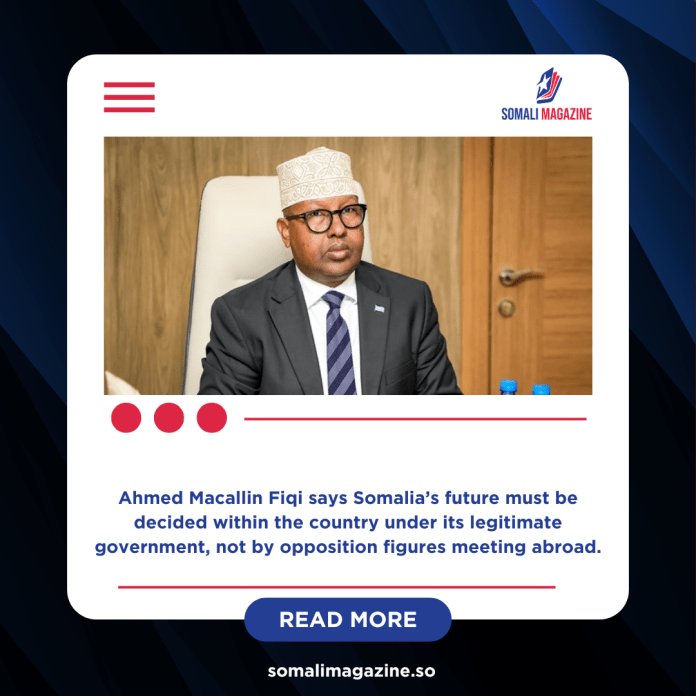Facebook Twitter (X) Instagram Somali Magazine - People's Magazine
Somalia’s Minister of Defense, Ahmed Macallin Fiqi, has strongly criticized a recent political meeting held in Nairobi, saying it serves foreign agendas instead of the Somali people. The gathering brought together leaders from Puntland, Jubaland, and members of the National Salvation Forum, who announced the creation of a new political bloc called the Somali Future Council.
In a statement posted on his official Facebook page, Minister Fiqi said that the destiny of Somalia must be shaped within the country, not abroad. He warned that allowing decisions about Somalia’s future to be made outside the nation undermines the legitimacy of the government and the state-building process. “The future of Somalia is decided inside the country, not in a foreign land that serves outside interests,” he wrote.
The Minister accused the political figures at the Nairobi meeting of working against Somalia’s progress and aligning themselves with those who have a history of destabilizing the country. He said it was unacceptable for individuals who oppose the very idea of Somali statehood to position themselves as decision-makers about the nation’s future.
Fiqi further stressed that Somalia already has a legitimate government tasked with leading the country forward. According to him, the responsibility to guide the nation rests with elected institutions, not with groups that gather abroad under foreign influence. He specifically referenced past attacks and unrest that, in his view, disqualified some of the Nairobi meeting attendees from speaking on Somalia’s future.
In his statement, Fiqi also highlighted the positive developments currently underway in Somalia. He pointed out that the government is consolidating security gains, producing oil resources, and preparing the ground for universal suffrage. He said it was “unfortunate” that at a time of national progress, certain individuals with what he described as “known backgrounds” were attempting to dictate Somalia’s direction from outside the country.
The Nairobi meeting included Puntland President Said Abdullahi Deni, Jubaland President Ahmed Mohamed Islam Madobe, former Prime Ministers Hassan Ali Khayre and Saacid Shirdoon, and Member of Parliament Abdirahman Abdishakur. The leaders discussed the current political and security challenges facing Somalia and agreed to form the Somali Future Council, which they said would play a role in shaping national dialogue.
Their gathering comes at a sensitive political moment. President Hassan Sheikh Mohamud is expected to travel to Kismayo for talks with Jubaland officials, part of efforts to ease tensions, resolve political disagreements, and prepare for the upcoming elections. The Nairobi meeting, however, has drawn sharp reactions from Mogadishu, with the federal government viewing it as an attempt to bypass legitimate state institutions.
Minister Fiqi’s remarks reflect the federal government’s concern that such parallel political initiatives could deepen divisions and weaken Somalia’s fragile state-building process. His message was clear: the path forward for Somalia must be decided by its people, inside the country, and under the leadership of its recognized government—not by political figures convening abroad.

